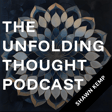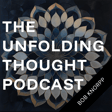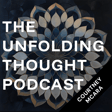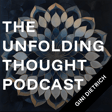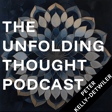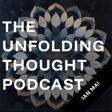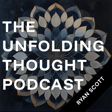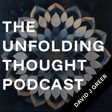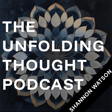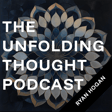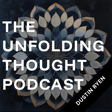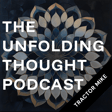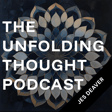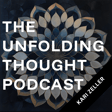Introduction to Unfolding Thought Podcast
00:00:03
Speaker
Hi, I'm Eric Bradom. Welcome to the Unfolding Thought Podcast, the show for leaders and deep thinkers who demand more than the usual fluff. If you're the kind of person who moves on from a book, video, or podcast the moment it stops making you think or introducing you to something you can use, I hope you'll feel right at home here.
Uncovering Forces Shaping Thoughts and Behaviors
00:00:26
Speaker
episode, we uncover the deeper, often overlooked forces that shape our thoughts and behaviors so you can see yourself, your team, and the world from a whole new angle and then actually apply what you learn to grow and do better.
00:00:42
Speaker
On the Unfolding Thought Podcast, we aim for minimal filler and maximum insight, challenging assumptions and sparking new thinking every step of the way. Are you ready to dive deeper?
Introducing Derek Mulhern and His Expertise
00:00:55
Speaker
Then let's get started. Have you ever implemented a best practice solution in your organization only to find that it created more problems than it solved? What happens when perfect strategies fail because we overlook the people who actually have to carry them out?
Why Generic Best Practices Fail in Strategy
00:01:15
Speaker
I'm joined by Derek Mulhern. a strategic advisor, consultant, and executive coach who specializes in aligning organizational strategy, team dynamics, and governance structures.
00:01:28
Speaker
Derek and i discuss why change efforts often fail to stick and how critical it is to move beyond generic best practices and truly connect strategy to the experiences and perceptions of the people involved.
00:01:43
Speaker
As will likely be obvious to you, this conversation with Derek really energized me because of how clearly he articulates the complexity and nuance required for effective organizational change.
Aligning Governance and Leadership with Strategy
00:01:57
Speaker
that you will find it equally as exciting as I did. And now I bring you Derek Mulhern.
00:02:07
Speaker
Derek, thank you for joining me. Would you mind telling me a little bit about yourself? Yeah, thanks for having me, Eric. My name is Derek. Hello. I am a people strategist and organizational strategist. I use my coaching lens on it often, but ah what I do is work with organizations to ensure that their governance structure their strategy, and their people are all aligned, have clarity, and that there's excellent leadership to drive alignment and ownership.
The Evolving Roles in Organizational Best Practices
00:02:39
Speaker
try and put a picture to what I do, it would be sequenced in some type of a triangle, but there would be like a revolving... arrow, like circular arrow, that is all about people.
00:02:52
Speaker
And so I say that because i will work with organizations on systems, on strategy, on organizational development.
00:03:03
Speaker
And at the end of the day, we can do all best practices and then people are going to do people things. And I think too often best practices don't actually take into account how people are evolving and changing.
Challenges in Nonprofits and Adaptive Change
00:03:17
Speaker
so we really have to be thoughtful about the people part of the equation always. So give me an example then of some of the kinds of situations or clients that you get called in to to work on. I primarily end up working with a lot of nonprofits and associations.
00:03:37
Speaker
who have operated in ways where they're trying to serve their own membership or clientele. Granted, most organizations or businesses are trying to serve clientele their business or customers. What they're often bringing me in to do is look at the area that they are experiencing right now that is in friction and really bring it into focus.
The Importance of Shared Vision and Morale
00:04:02
Speaker
what that looks like, worked with an organization recently recently where they were really strapped with volunteer engagement. Their volunteers were burning out. They didn't have alignment on from the staff on what it was that they needed or wanted.
00:04:16
Speaker
And the staff had disparate ways that they worked with some of their volunteers. As we looked at the organization, they had 20 plus volunteer committees.
00:04:28
Speaker
And what the reality of that was, is that they had created a structure that was unmanageable and people couldn't work within anymore. And so while, yes, we needed to create the structure and or recreate the structure, and I proposed a new way to relate to it and go about it.
00:04:48
Speaker
The piece of it that was so important was, are people going to respond to this? You know, if you take a decades old system or process that these people have been very bought into out from under their feet, you can't always make the change you want to make or you think is the best.
00:05:05
Speaker
Sometimes you have to make the change that is the next best change or the geared approach that brings the people along. And so how do we consider people and every equation?
00:05:18
Speaker
Because if we don't, we're going to end up too often following some consultant cookie cut cutter problem to solve a solution that doesn't actually get us where we're going, because we're goingnna have way too much. We're going to actually create more friction and less focus.
00:05:32
Speaker
So I'm guessing then that there are circumstances that you are brought in work on getting more volunteers, more engagement from volunteers, more repeat volunteering, just to keep going with the volunteer aspect. And I know it's broader than that, your work, but...
00:05:52
Speaker
there are times when you're brought in for some aspect of expanding that kind of work. And they have previously tried the best practice or whatever was in the Harvard Business Review.
00:06:08
Speaker
And after six months or 18 months, despite a lot of change-like activity, ah change the that your client now has experienced is the negative aspects of that, such as, for example, morale is now poor because people are burnt out on change or attrition or something
Assumptions in Best Practices and Flexible Approaches
00:06:33
Speaker
of that nature. And so am I thinking correctly that you come into a situation thinking, you know, what your client wants to do, that's great,
00:06:46
Speaker
But when you've tried previously, you've not laid the groundwork to, as I think you fairly clearly laid out, bring the people who are one of the most crucial pieces along with that change, to see that change, to understand why the hard work is going to be worthwhile, perhaps.
00:07:04
Speaker
Yeah, I think that's a big piece of it. I think the the one shift I would offer in all of it is, yes, that's it. I think it's nott less of a shift and more of an addition. The other piece to that is we often, when ah like how humans operate, I do it too, shocking.
00:07:20
Speaker
is we look at the challenge issue problem that we're having or the thing that we want to change and be different. And we go into without speaking it, without doing anything, we go into visioning in our own brain about what is the perfect state.
00:07:37
Speaker
Like call it the oasis state. Like you end up in the oasis island that has a perfect palm tree, your favorite cocktail, the perfect amount of sun, the perfect amount of humidity and a public, not a public, but a nice little restroom for you to go use whenever you need to. Like you got the oasis of exactly how you would create it And we really focus on moving from problem to oasis.
00:07:59
Speaker
And what that does is in our brains creates a start and an end and ah start and an end create an experience. And that's that's part of what makes an experience. We could go into some really deep stuff to talk about experiences.
00:08:14
Speaker
But as we talk about then how people will relate to it, they will then put on their hats Is it good enough? Is it perfect? Did we make it to the oasis?
Aligning Organizational Change with Personal Experiences
00:08:26
Speaker
is the cocktail that I'm having in the oasis cold enough or the right temperature? And what the the reality of change is, is that we're never actually getting to a finish line.
00:08:38
Speaker
We're actually on a constant... iterative process that has us always adapting, changing, communicating, and having to reinforce what alignment looks like.
00:08:51
Speaker
So that is part of what I do in that process with people is I say to them, hey, I know that this is what we're talking about as an outcome. i want you to be aware that in your brain, this will likely solve all the problems.
00:09:05
Speaker
It's not going to. And that is the people piece. like helping to bring them along in the journey to be comfortable with it so that they are actually able to optimize whatever choice they make by not destroying it because it's not what they thought it was going to be or it didn't solve all their problems.
00:09:24
Speaker
So, yes, the goal is that it will make things better and work. provide positive outcomes and you know there will be less burnout all of those things but there are going to be a couple new things that might pop up because of it but the process that we go through helps us to get clear helps us to get aligned and allows for us to know who's taking ownership of what as we move forward It sounds to me like there must be some either work on or communication around we are undertaking this project and the reason that the hard work
Collective Visioning for Organizational Alignment
00:10:06
Speaker
is going to be worthwhile
00:10:07
Speaker
and that the continued hard work, that this journey never ends sort of thing is going to be worthwhile is because we have a certain set of mission, vision, values type, you know, guiding principles, perhaps.
00:10:24
Speaker
So do you then bring back up or help to develop or help to align people's understanding of why are we here in the first place? Like, what is this organization doing?
00:10:40
Speaker
And then let's understand this project in that bigger picture? Yes. i'm I'm giggling a little bit because it's almost like you've either been sitting in on some of my sessions I've been doing with a specific organization or noodling around in my inbox because that is the gist of it.
00:10:59
Speaker
I do my best to use different language Just because if you go specifically into a nonprofit and you start saying the word mission, vision, values, you have already undercut yourself as the person that's coming in with credibility.
00:11:13
Speaker
And that's unfortunate because those things are actually extremely important. But without having that shared understanding of like, who are we and what are we creating? um The way I like to put it is, what are we actually committed to us creating in the world?
00:11:28
Speaker
our organization, if we did all we wanted to, like, what would that actually create in the world? Not take away, like we might take away hunger, but what are we have actually creating instead of hunger? So if we can really be present with that, it allows for us to make our decisions in a way that is going to allow us to be in breakdown and actually figure out problems that and find solutions to them.
00:11:53
Speaker
Versus if we don't get centered in what we're trying to create over here, all we do is relate to problems as problems, not opportunities to move forward and create different change.
00:12:05
Speaker
So you talked about an individual, I think it was, getting into that visioning process. And I'm guessing at some point,
00:12:16
Speaker
you get into a collective visioning process because it seems like you're kind of saying that in different words in what you just said, that we need to more or less create a clear picture or a concrete picture of how the world will be different or what our quote-unquote end state looks like.
Defining Outcomes to Prevent Misalignment
00:12:42
Speaker
so that we actually know what we mean when we say our mission or our goals or something of that nature. I think the fascinating thing is as humans and organizations, because shocking organizations are made up by humans.
00:12:58
Speaker
We also really this is a blanket statement, but we often don't know what it is that we want or we need. ah Nine times out of 10, if you ask somebody what it is that they want, really listen.
00:13:10
Speaker
You're going to hear them say, i don't want this. I don't want that. I don't want this. And they're going to like make a list of all these things, but they're not clear on what they want. And so some people will really push and do a lot of work to get people to see what they want or what they need.
00:13:26
Speaker
What I like to do is actually say, let's not worry about that right now. But let's actually go back to that word experience. What's the experience you'll have? What's the experience of the world of, you know, I work with a bunch of LGBTQ farmers. So LGBTQ farmers, um what's the experience that they're having because of the work we're doing in the world?
00:13:46
Speaker
And so if you can get centered on that experience, you're not going to find yourself in a pattern of like adjusting and doing things different constantly, because that experience is pretty clear, right? Like
Internal Brand Alignment and Cohesion
00:14:00
Speaker
you want to come home from work at the end of the day and not be plagued with a bunch of emails, have it feel like a smooth process for making dinner for family and the kids and have a little bit of relaxation time, maybe get get to the gym.
00:14:13
Speaker
Like everyone wants that to be a pretty simple experience. And so if we can be grounded in the experience that we're trying to have, it helps us drive and not just go, hey, the political winds have shifted. Now what do we need to do differently?
00:14:27
Speaker
Yes, you can have tactics that are different, but it doesn't change the experience we're trying to create for people in the world. I frequently talk to people about whatever change it is that they're implementing, they're building a team or they're merging teams or they're attempting to shift a brand. And one aspect of shifting that brand is some rollout of the brand internally that will then, you know, the inside will come out and then the customers or whatever will experience it.
Vision Alignment for Successful Transformation
00:15:00
Speaker
I and frequently trying to communicate that there are a lot of ways in which one of your stakeholders, let's just say one employee perhaps, but it could be entire teams of people,
00:15:14
Speaker
They may actually want the same thing as you, but for one reason or another, they have not seen that what you're trying to do connects with that future state that you both want.
00:15:31
Speaker
And a former colleague of mine, Jeremy Nulik, who I think I talked to you on maybe episode two of this podcast, Recently, he and I were talking about this, and the way that he described it was, I think it was, sometimes I will ask people to describe that future state as if they were writing the outline or the script for a documentary about that thing 10 or 25 years in the future.
00:16:02
Speaker
And so I'm not just saying, tell me what life is like. I'm saying we are going to talk about all aspects of this business, perhaps. And yes, we will talk about how it gets there, but we need to paint the picture in the way that a 60 minutes expose on your company might paint it.
00:16:24
Speaker
What's it like? Not just how big the company is, the revenue or the number of employees, but what's the soul of the business and why are they there? And because they are there, things feel a certain way.
00:16:41
Speaker
And I really like that, and it feels to me like that's in pretty close alignment to trying to bring to life the words that we often use are the same, perhaps, goal-like statements, but they the vision that we have in our head ends up being quite different. And we only realize it once we're so far apart on this journey that then two teammates that should have been on the same bus realize we're actually going to different destinations.
00:17:14
Speaker
Yeah. And i I think one of the things that I see in it is that the destinations, I'm trying to like pull myself from the cloud so that this isn't just like some really big ah meta explanation.
Redefining Success Beyond Metrics
00:17:27
Speaker
We get really tied up in the vision, not the vision, in in the tactics of what we see success looking like. So let's just use me for example, say I want to create a million dollar business.
00:17:41
Speaker
So if I get to $998,000. Did I succeed or fail? And I say that because when we even have two teammates that end up going in different directions and end up at different destinations, the question we have to ask to ask ourselves is, is that destination like really specific on the metrics and the the goals that we laid out?
00:18:06
Speaker
Or are they actually just truly different experiences of what we were trying to create and we didn't communicate what that was or get alignment and buy-in on what that was up front?
00:18:17
Speaker
And it's a little bit why I have like ah a bit of a beef sometimes with KPIs. A lot of people will come at me for that, but we can check off all the KPIs and say we accomplished them, but does it actually create what we're trying to, like, are we actually getting the result we're looking for?
00:18:32
Speaker
And so those are just the types of things where, When we think about strategy, when we think about alignment, when we think about people being like bought into the ownership of the work they do within an organization, and just think it's so important that we're taking a lot of time on the front end to get really clear on what we want to do. And I think I've even had to really work on that as like a coach. So
Coaching for Long-term Success
00:18:58
Speaker
I, my coaching practice I've been doing for three to four years now,
00:19:01
Speaker
So I do some one-on-one coaching, not as much as I used to. But the question I always ask people so that I could get really clear on what we were working toward that weren't just like the things is ah would ask the question, it's three to four years from now.
00:19:17
Speaker
After this one year of us working together, we lost connection. It's three to four years from now. We're walking down the street in X city and we bump into each other. What happened?
00:19:29
Speaker
Like what's going so great in your life, in your job, in your organization that when you see me, you are going to grab my arm, pull me into a coffee shop or a bar, buy me a drink and talk about why it's so amazing. How our work helped to support that and like what your life is like right now.
00:19:50
Speaker
Because what that does is it aligns us in what we're working toward as a team. While it is their role to like get it done and do the job, I then know how to support them in working toward a bigger picture item rather than saying, I want this promotion. Well, are you going happy with that promotion?
00:20:08
Speaker
um And so this is more individual level. But I think these are also the things that we have to realize these individual experiences and how people relate to them are also what's going to build working towards the brand rollout or the merger or the renaming of the organization.
00:20:28
Speaker
Right. They're all different types of things. And so how do you find those people's buy ins through the experiences that you're creating? I do not remember where I encountered this, but there was some book that I read and they talked about an exercise that they would do periodically.
00:20:46
Speaker
and you probably heard ah version of this before. Imagine you are reading your obituary and the first paragraph is, all about you as a person, whether it's a community member, a family member, what you meant to the community, who knows what it is.
00:21:07
Speaker
But it's starting close to home and you know personal life or however we might describe it. The second paragraph, is all about your career. The third paragraph describes the project that we're working on right now, like the real big transformation.
Personal Visioning and Organizational Objectives
00:21:24
Speaker
Now, what is it that would be so important about the thing that we are working on or what would make it important enough that it would be the third paragraph in your obituary.
00:21:37
Speaker
And whether you've encountered something of this nature or not, you reminded me of this because I will sometimes ask people to come up with something like that individually and then come together as a group and talk about it because they will often, one person will be reading their obituary more or less, or even just giving us the bullet points.
00:22:04
Speaker
And someone else will hear that and have a realization or an insight and say, I never thought about this. Or, you know what? I've been thinking the same thing. I didn't realize you were thinking the same thing.
00:22:19
Speaker
And until we describe that experience or until we start to paint that picture of a future vision, however it is that we want to put it, there are things that go unsaid and there are things that are sometimes just unconscious and they never come out until we have a place to expose those things together.
00:22:41
Speaker
It's a fascinating way to think about it because I think sometimes as I've gotten deeper into this work, I'm like, is it this basic? Like, because it's, it's basic and it's complex. It's complex because we're humans.
00:22:53
Speaker
And so we are going to, the way I like to say it to my clients is like, okay, so we had this conversation, all this, and now you're going to go be a real human being and you're going to not listen to this, not follow that, make the next decision.
00:23:09
Speaker
And it's so easy conceptually to talk about these things. But I think that the true work lies in making them ingrained in the way that we approach work or not even work, I think life, but work is what's coming to mind so that it isn't a froofy exercise.
00:23:32
Speaker
It isn't another... brainstorming session but that there is true buy-in and we've created a culture around why these things are important and how that moves the needle forward in a in a way that is actually beneficial to the organization and beneficial to the human and exciting to the human and normalizing the experiences that are going to happen along the way, you're not going to please everyone.
00:24:02
Speaker
Somebody is going to leave your team. You know, you're going to miss some deliverable that you said you would do And 99.9% of the time, the world didn't melt. It's fine.
00:24:14
Speaker
And things are still still the trains are still arriving on time. But the way that we relate to and what we make it mean really just shifts the perspective of like allowing ourselves to find or see the success. And so it's like a long winded thing that's overarching. But what I'm really trying to just point to here is as you're talking about this kind of speaking it out loud so that people see what others are thinking,
00:24:43
Speaker
I think there's a real space for us to create more with organizations in speaking to what we see and breaking down the the barriers to what people relate to as conflict so that we can have open dialogue and honest conversations in a way that just has us seeing each other.
00:25:04
Speaker
And really relating to each other because we've actually opted into the organization because of its values, because of its mission, because of its vision. And so when we roll our eyes as employees at those things, that's why you went for the most
Transformation vs. Change in Organizations
00:25:19
Speaker
part. Not everyone.
00:25:20
Speaker
Some people are there to literally collect their paycheck, which by the way, everyone is fine. Like people need to do that. And those players on your team are wildly important. But...
00:25:31
Speaker
we as people who are really dedicated to like succeeding went to this organization for a reason and we need to also be really bought in and remember that because it actually is a lot of what joins us together so I don't recall that you used the word transformation, but I think I did at one point. And whether we go with the word transformation or we just say, hey, this thing sticks.
00:25:59
Speaker
At the risk of restating some of the things that you've already stated, I am interested in ensuring that we make it explicit. So what does transformation or what does it look like when this thing, this change,
00:26:16
Speaker
actually sticks. Yeah. Well, I think we have to start with, so two things I'm going to use to frame my answer to this. One, transformation is a current buzzword that I think gets overused.
00:26:28
Speaker
I am very bauding on what transformation is. I think that there are communities that have used it in a way that has taken its power away and doesn't make it as useful as it is. So I say that because I want to start with like baselining what is transformation.
00:26:46
Speaker
we have change something that is going differently than it went before and has made like real thoughtful change like alterations to make something go differently change doesn't have to be permanent those things might might go away they might change in another way they might not get you what you were looking for transformation is a full way of having gone through change processes And really creating a state that is fully different and relates to the world as different and relates to the things around it as different.
00:27:20
Speaker
And it is a more permanent, I would say it's a more permanent framing of the word transformation or of the word change. So transformation is like, we've moved forward. It's behind us. It's not it's not going to be something where we're looking at because we really harnessed what it is.
00:27:37
Speaker
Now trying to circle back to your question. So when we think about transformation and how that ends up looking in an organization, it is that the outcomes or the way that we relate to the outcomes, this looks permanently different.
00:27:52
Speaker
It looks different in a way that the way we saw it operating, the way it was operating, the challenges that were in the way are no longer Because we have actually shifted a mental mindset of the team, of the culture, of the organization in a way that just operates fully different around this.
00:28:13
Speaker
And it's embedded in what we do. To me, that's where we see the actual transformation happening. But it is a, in my opinion, very mental thing. Like it is a very, like, I don't want to say mindfulness, but it is a way of actually allowing yourself to win and seeing how you can go through the process to make the shifts to actually live them and not just say, we're going to bring in a consultant, they're going to change these things, it's going to fix our problems.
00:28:44
Speaker
Yeah, it sort of sounded to me like some of the things you were saying earlier were like when this thing is successful, this effort or project or whatever it happens to be, however we want to characterize it, it's not that we lost weight because we went on a diet and then we reached our goal weight and we can go off the diet as much as we become a different kind of person in the sense that we eat a certain way or we eat certain things.
00:29:20
Speaker
And maybe that's because I want to have ice cream and I have just made the commitment where I'm no longer a person that eats ice cream. And that's a rule that I follow.
00:29:30
Speaker
Or maybe I no longer even have a desire to eat ice cream. However it is that it functions once I end up there, there is a change that I don't want to be too broad here, but at the risk of overgeneralizing, there is a change that sticks was kind of how I was hearing it.
00:29:49
Speaker
Yeah. Yeah, I think I don't think that's overgeneralizing it. And think you put it in much, much clearer terms than I did. It's it's it's when it's ingrained. It's like when it's actually something that's part of who you are and how you show up or who the organization is and how they show up.
Assumptions in Leadership and Strategy
00:30:05
Speaker
You mentioned a few times, I think it was working a lot or primarily with nonprofits and associations So you can answer this in terms of how those groups or those boards tend to to be or see things, or you can answer it more broadly.
00:30:30
Speaker
I'm wondering, in your experience, Are there hidden assumptions or mental models that leaders or boards, leadership teams perhaps, the groups that you work with often bring to strategy or governance or team building that end up getting in their own way?
00:30:54
Speaker
Yeah, there's a lot of them. As I i think, i think one of the primary ones, and I think the the challenge here that you'll see sometimes is like, how is the board compromised? If you have an association or nonprofit board, what you have to keep in mind is especially in associations, it's going to be made up of people that are Let's use just an example, American Dental Association.
00:31:15
Speaker
I don't know this since factual, so just go with me on it. Probably going to be a lot of dentists on that board. Dentists probably are going to have a mental way of thinking about things that have a lot of similarities.
00:31:30
Speaker
While these people may have different diverse backgrounds, they're going to show up with some assumptions of how things must work, especially if you start talking about teeth. So I say all that because people come in with their own assumptions of how things should operate. And in an association, it's this special little thing because you're bringing the people together because they already have some of these like-minded things.
00:31:55
Speaker
And then you put that into a governance model where they have to make decisions. And you're actually saying, hey, we want you to group think. And we already know that a lot of your vantage points are exactly the same.
00:32:08
Speaker
And so we have to break that down to help really bring people along. And so the way I would say it and I'm happy to share some of the common ones, but I think one of the ones I see often with nonprofits is, and this is probably ones that are on their like,
00:32:25
Speaker
under $10 million, maybe under $5 million dollars operating, is that they have this mindset of, we don't have enough money, um and we must save money. And so they operate in these ways of making decisions around saving money, and you trying to raise money, and ensuring that there will be money for them when it's needed.
Addressing Misconceptions in Nonprofits
00:32:47
Speaker
Instead of saying, here is the experience you're looking to create if our organization is successful. Now, what are the things that we need to do? And one of them might be a really big capital expenditure that's going to not drain their bank. I'm not suggesting nonprofits should go drain their bank. Like there are realities and like looking at your dollars.
00:33:06
Speaker
But when you're taking the the scope of let's always watch what we're spending, you're going to start missing things. You're going to start leaving things behind and you're going to start becoming risk averse without even knowing it.
00:33:21
Speaker
And so that's like one very common one that I see. Another one is related to nonprofit boards is that there's a common belief of fundraisers can go raise the money. Yeah.
00:33:32
Speaker
They can, but these are years-long processes. This requires a lot of input from a other a lot of other people within the organization and on the board. and the fundraiser isn't just going to walk in look at the CRM, and magically go raise $3 million. dollars It does not work like that.
00:33:50
Speaker
And so I think what I'm kind of pointing to in these people behaviors is that people already pin people as as operating in a certain way. And so you and I have our own belief system and operate in certain contexts.
00:34:05
Speaker
So do organizations. So do professions.
Mindfulness and Empathy in Leadership
00:34:10
Speaker
So do sectors. And so as we look at that, there are different vantage points of how people will believe other people all operate that are really going to undercut the work of the organization.
00:34:23
Speaker
It sounds to me like you are going to want to bring out of board members, or you're going to want to train your clients as individuals to bring out of their colleagues things like mindfulness, humility, empathy seems pretty big.
00:34:46
Speaker
And then I think we could go on and on with the list of avoiding logical biases or logical fallacies or whatever else, because i think one of the early things you said alluded to You get really good as you go up the line in a nonprofit at thinking a certain way or honing, you know, sharpening one edge of a blade.
00:35:15
Speaker
And then you get to a certain point where you need to open your mind back up so that we don't just, you know, zoom in on one way of thinking about things and miss all the other opportunities or whatever, because now you're at a level where your organization needs you to think more broadly more creatively, more empathetically, any number of things, then you had been asked to think just the day before you were promoted to this position.
00:35:49
Speaker
This is where to me curiosity and trust come in because what what I see a leader's job is to be curious constantly instead of instead of what?
00:36:02
Speaker
It could be a number of things. Just be curious. Like know that you don't know it all and know that you that in partnership with others, asking questions and digging in is always going to to yield you more than not.
00:36:17
Speaker
And then trust. is the concept of allowing and believing that things can be handled and that you don't need to touch it all. You don't need to be engaged in it all.
00:36:30
Speaker
And that the system is working already. There may be things that need to change, evolve, transform, but that It's not broken when you walk in.
00:36:42
Speaker
And so the reason I kind of say curiosity and trust and even frame up trust how I did, we could argue there's a lot of ways to define it, is we really talk about somebody moving up in an organization.
00:36:53
Speaker
The way that I frame this is that the reason that you've been so successful is the reason you're probably going to fail in this next position. So
Broadening Leadership Perspectives
00:37:02
Speaker
you are probably really good at managing events.
00:37:06
Speaker
You've gotten so good at it. You know to do it in your sleep. You've now become the person that does the events and the sponsorship. You now know how to do the sponsorship too. Amazing. And because you're so good at these things, when you get promoted now to be the chief operating officer of the organization,
00:37:22
Speaker
Now you're focused on so much more all at once. And your thought process is, I need to know it all. I need to help. I need to go fix the things that are broken.
00:37:34
Speaker
i need to, and what you need to do is take a step back and realize that you're not an event planner anymore. You're not person that's going out getting sponsorships. And you may be really good at that, but it's not job.
00:37:48
Speaker
And the more that you try and understand and have your hands in it all and control it all, the less successful you're going to be.
00:37:59
Speaker
So the thing that made you really good was really focusing and perfecting it all. Like you were able to control it because that was your baby. That was your thing.
00:38:10
Speaker
And now you can't control anything because you don't have, you could never reach your arms out wide enough to hold on to it all. But you're going to try. You're going to try and hold on to it over here. You're going to go try and hold on to it over here.
00:38:23
Speaker
And it's just going to cause so much friction. And so what you're going to have to learn to do is this is the joke I use is you're gonna learn to fall out of your chair and when I say that people are like what do you mean I'm like you need to lean back you need to lean out you need to just feel a bit and learn to listen and learn to be present but that you have leaned back so far and you've just gotten curious rather than trying to solve and fix it all that fall out your chair
00:38:54
Speaker
So learn to fall out of your chair, lean back, because what you've been so good at is jumping in, fixing, solving, making the end product perfect. And now somebody is looking for actually quite the opposite from you.
00:39:07
Speaker
You know, you have now also reminded me of a situation or a behavior that I feel is understandable, but also unfortunately common, which is that at any level of management, I'm going to call it, people will often think that it just makes sense for that person or that team that's doing that thing to report to me because, well, I'm going to tell some story that we need to do some reorganization perhaps, and that team needs to be moved from that department over to my department.
00:39:48
Speaker
And The story that I put together will often feel entirely rational, but if we peel it back, maybe it's not all that logical. It's more emotional, if I can draw some distinctions here.
00:40:04
Speaker
And I think a lot of times when someone is elevated to COO, and previously there was a chief HR officer, maybe,
00:40:17
Speaker
And under HR, there was a team and you're having to collaborate with them or give input. And you now feel like it just makes sense for that team to report to me. I think a lot of times we feel like we have to have control over a person or a department.
00:40:39
Speaker
Because we can't really see how to let people be people, which is they have their own desires and they have their own way of understanding words and goals and process about how they're going to go about their work.
00:40:56
Speaker
And we think that that we can fix that if they just report to us. And
Redefining Leadership Roles
00:41:02
Speaker
that, at least in my experience, never solves the problem. Yeah, it's actually probably the thing that's going to make it worse faster, which may ultimately be a good thing because now we're going to have to look the problem in the head and figure it out or No, I think it's just funny because one of the things I have really challenged leaders on in organizations when they get to this point where like, oh, well, I'm doing really well in this in this role. And like everyone under me, like we're all rocking it.
00:41:30
Speaker
But the organization has some challenges and they need stuff to figure it out. And I'm not in a position to do it. So they really look at this positionally like, well, you have to be in a certain position to do certain things. And the end of the day, you're going to sign the tax papers. You might want to be the COO, the c CFO, like probably a good idea.
00:41:49
Speaker
But we forget like the root of the word leadership is leader and the root of that is lead. And so leading means making a decision and going.
00:42:01
Speaker
And it it actually goes into the way that I've i've really looked at ownership. You've heard you've probably heard me say the word ownership a couple of times so here. It's one of my i shiny keywords I like to use because I think people don't know what to do with it.
00:42:14
Speaker
So I look at it as that there's four different levels of ownership for us to look at in what we do. One, you're my boss, Eric. So one, I'm like, Eric, how do I do this? That's level one. Level two is like, hey, Eric, you had my position before this. Like, how did you do it? Like, like, what did you learn? Like, I'm actually not asking you directly, but like, I'm trying to get some information and how you did go about it influence what I did, what I can do.
00:42:39
Speaker
Level number three is me saying, hey, Eric, I'm thinking I'm going to do X. What do you think about it? Well, much better. Derek is like bringing something. you Level four is, hey, Eric, this is what happened.
00:42:52
Speaker
This is what I did. let me know if you have any questions. All I did was keep you on the loop there. And you could say, no, that's not what you should have done. I would have done it differently. But what it is, is that you're taking the place of saying, hey, the team or the person that I think needs to resolve below needs to be below me.
00:43:11
Speaker
Actually, you're just starting a conversation about something that you see in the organization that may need support. But you need to start with getting curious about it because you don't know all the details. You don't know all the facts.
00:43:24
Speaker
um And you're very likely pretty siloed in how you've operated in your zone of genius before. And there's a lot of different reasons. And so as you grow in leadership, your job is to push more people to take ownership, for you to delegate ownership, not just delegate the task.
00:43:40
Speaker
And for you to get really clear for yourself on how you're going to have to start showing up differently, because at the end of the day, you can't do every single thing. And so your job becomes like the bowling alley bumpers.
00:43:54
Speaker
Like your job is not to get the pins down. Your job is not to throw the ball correctly. Your job is to keep it from falling in the gutter when it's about to fall in the gutter. And so that means everyone needs to be aligned.
00:44:07
Speaker
That means people need to be bought in and have ownership of what they're doing. And that's your job. Your job is really around the alignment, the ownership, the collective thought process of where we're going.
00:44:19
Speaker
I really like that visual of the bumpers in the bowling alleys. Thank you for that. haven't said it before, but it's always been in my brain when I talk about it. That's awesome.
00:44:30
Speaker
You know, it sounds to me like you may very well actually have said this now that I'm about to ask the
Interpersonal Dynamics and Organizational Challenges
00:44:37
Speaker
question. You might have said this early on and that. Often organizational challenges turn out to be personal or interpersonal challenges in reality.
00:44:49
Speaker
I would say like 90% of the time. I mean, but let's be real. There are structural challenges, but this is, and I don't actually think I said it. So you're not repeating. This is though, if I said there's a triangle model,
00:45:02
Speaker
that I work within, this is why the people goes around it and never stops. Because at the end of the day, we have to learn and understand and see how we interact with each other. Those are always going to be the things.
00:45:14
Speaker
I was recently working on working with an organization where the leadership team had come up with, let's call them values at this point. They'd come up with some values. The organization had to operate under those values before.
00:45:27
Speaker
They wanted feedback from the team, like the staff team, about all of these values. So Derek, can you go get that feedback so we don't have to be there so they can really feel like they can speak openly?
00:45:38
Speaker
They related it to why is a stranger coming in? They related it to what are we doing wrong right now? They related to it. And it sounds like there's something that you guys are trying to get out of this that you're not actually speaking to.
00:45:52
Speaker
When literally i have this is one of the organizations i it it's been so easy to work with because they got so clear on what they wanted and they were actually so aligned on it so quickly But there is something that the the rest of the staff felt in it.
00:46:10
Speaker
It could have been my own presence in something that I wasn't aware of. But I think what's so fascinating in that is that we got all the data we needed. Like the data was not around the values and if people like them or not.
00:46:22
Speaker
It was around how people related to the work that was being done. They related to the transparency. They related to how the organization approaches challenge.
00:46:35
Speaker
And so to me, that was just wildly fascinating because when I took this back to the team, they were like, we didn't get what we needed. i was like, you got exactly what you needed.
Tools for Feedback and Organizational Alignment
00:46:44
Speaker
Like you're just, seeing you're not seeing it in the way you want to see it. So again,
00:46:49
Speaker
People are going to people like this was never actually about the data we collected by what came out of their mouth as the specific answer to the question. It was how did they see it and relate to it?
00:47:00
Speaker
When you're working with ah leadership team or a board or maybe even when you're going to talk to people the staff at some level and get their feedback on something like this.
00:47:16
Speaker
Do you have a favorite set of tools or exercises that you go to often? I've got a few. um Again, I like I don't want to say this out loud because it makes it feel so basic. like Like the first one is literally always like almost any project I'm doing.
00:47:35
Speaker
Let's take a minute or 30 minutes or an hour. Let's do visioning. Like, let's talk about what this is going to be like. Like, let's actually talk about that experience.
00:47:45
Speaker
And that's actually really hard. Sometimes people don't even know how to get into it. So I would say one, there's that tool that like, I just love because I think it's so important. Another one is it's around overwhelm, but you can actually use it for almost anything.
00:48:00
Speaker
And what it is is you start by identifying like, but let's talk about this in the in the terms of overwhelm. When you reach a certain point, and overwhelm um you know what that point is it's it's your snapping point it's your breaking point like it's when you sit there and you know for you it maybe it shut down for me maybe it's scream and run away like for someone else it's maybe i'm quitting and done with this but you can usually relate to that pretty quickly and then what we do is we go what's the thing that happened after that well what happened right before ah
00:48:34
Speaker
And then keep going back and forth and back and forth until you've made a whole circle. And now what you've just identified is it's a cycle. Your overwhelm is a cycle that you will get into over and over again.
00:48:46
Speaker
And now that you've identified it, you can say, I'm at this place. What do I want to do differently than what I've done before? And this can be organizationally too. Like how does our organization break that cycle by knowing what our indicators are and being so self-aware of ourselves that we will interrupt it.
00:49:06
Speaker
And so you can use that with so many different things. Once you you use that tool of people, then they get to really see like how process works and not process like, These are the 15 steps that we need to get this application process through.
00:49:20
Speaker
But the process of how we operate as a unit and where the breakdowns happen usually. And so then you can see it in real time and you can start to notice it. So that's like one of my favorite tools.
00:49:32
Speaker
And then the third one that I use often is just a relational tool around promises. People look at like, what does it mean to make a promise?
00:49:44
Speaker
Okay. So what does it mean when somebody makes a promise to you? And what we get into is like, what's it mean? Like if somebody could keep their promises, what's it mean if you could keep your promises?
00:49:55
Speaker
Nine times out of 10 people walk away from the exercise and go, oh crap, I really either hold a huge standard to myself on my commitments or to other people, or I judge them or I judge myself.
00:50:06
Speaker
And what if it was just a commitment flat? You did it or you didn't. It's not good or bad. It's just what happened. So I would say those are the my three favorite ones um because they're so applicable to an individual, but can also be really pulled out into a wider way that an organization operates.
00:50:23
Speaker
I really like that overwhelm cycle exercise because ah feel like there's not just a the outcomes of, think, being able to plan or, you know, make, create measurements around, oh we're getting close to this thing, but, you know, maybe something that suffuses...
Aligning Team Values with Project Goals
00:50:51
Speaker
at least how I'm seeing it at the moment, the whole thing is raising our level of self-awareness, becoming aware of something that we were only aware of in times of pain.
00:51:05
Speaker
And so, as a former boss once said, we were dealing with some issue, I forget what it was, and he asked, is this a circumstance or is it an issue?
00:51:17
Speaker
Because if it's a circumstance, then there's only so much that I'm really going to care about investing in a solution. But if it's an issue, at least in his definition, it recurs.
00:51:28
Speaker
And so let's just fix it once so we don't have to deal with it. again the third thing that you said reminds me of an exercise that i will do with groups now and then and their versions of this i feel like yours is the same and yet different depending on how you look at it but basically what i'll do is i'll get a bunch of values words And so those will be things like integrity and communication and who knows what.
00:51:58
Speaker
And we may have 30 or 50 of those words. We'll give them to ah team or people working on a project. And we'll say, and we're going to have to pick just a few of these that are our values for this project.
00:52:13
Speaker
And we'll you know People might pick different words, but eventually they settle on, you know you have three words and I have a set of four words and two of them overlap and then other people have different words. But amongst a group of four or five people, we end up with six different values.
00:52:33
Speaker
And then I'll have them start talking about Well, when we say integrity, how does that actually show up in the project? What does it look like? What do we experience?
00:52:45
Speaker
And once they start talking about it, I might very well realize that I guess I don't really value my understanding of integrity as much as I value the next thing that we talk about.
00:52:59
Speaker
And other people start to become aware of, oh, if that's what integrity or trustworthiness or who knows what means, then I am or am not going to commit to that for this project.
00:53:13
Speaker
And then once we start to talk about how does it show up, what's the experience, then we can get really clear on on this project. Of course, we have to deliver and we have to hit whatever those KPIs or whatever are.
00:53:30
Speaker
But when we make that promise that thou shalt not lie or whatever it is, we know what it means. And we're not going to end up pointing fingers and saying, you don't stand for that value when the person very well, if we didn't define it, is going to think, yeah, I do.
00:53:48
Speaker
Maybe you don't. And I appreciate getting clear on things like this because come it kind of comes back to some of the things that we've talked about. We use a word and we don't really know what it means, you know, or we have a goal statement and we don't know what that experience in the future is going to look like. So let's get clear through visioning, through talking about what it look like to hold hold ourselves to a promise and so on.
00:54:11
Speaker
a i I love it. Thanks for sharing. me to i'm I'm giggling over here because my fiance and I both work from home. He actually went to the office today and think was Monday or Tuesday.
00:54:22
Speaker
He popped out of his office and came over mine and was like, hey, do you got a second? I was like, yeah, what's up? And he's like, so, and he's on like a promotion track for the organization he's with.
00:54:32
Speaker
And he's like, they have us working on this kind of development program and I have to name what my values are, but I'm not just supposed to name them. I'm then supposed to define them.
00:54:45
Speaker
And it was just this really like clear moment for me of like, not that it was hard for him, but I could see him trying to wrap his head around it and realize as we were talking in real time that this had nothing to do with like,
00:55:00
Speaker
the words of the values, but for him to define for himself how he sees himself acting, operating, and being as a leader rather than some words that mean something or that we think mean something.
Conflict and Leadership Perspectives
00:55:16
Speaker
but they mean something different to everyone. And I think, Eric, this goes so deeply back to the same, thing not the same, one of the things I've been kind of laying in here is that We all relate to things differently.
00:55:30
Speaker
And so I can revert back to this staff thing I was talking about that like, they were like, what's wrong? Why are we doing this? Who are you? actually did that in three sessions with three different sets of staff randomly.
00:55:45
Speaker
The first two were exactly what I described to you already. The last one was wildly different. I still can't fully put my finger on it on why, but What one of the people said was, I don't know why we're talking about this. If we have conflict, we just need to to talk to each other.
00:56:06
Speaker
Like, whereas the group before had said, i don't feel safe or comfortable sharing my opinion here because I don't know if someone else hears it, what they'll do with that.
00:56:17
Speaker
That's no different than conflict. And all that to say, we had two people. That created completely wildly different environments for the whole hour-long experience of us being there because the way that they related to conflict is so different.
00:56:36
Speaker
And so it just goes right back to this challenges, problems, what's the interpersonal piece of this? And that's why, like, as much as I have thought I don't do as much one-on-one coaching anymore.
00:56:49
Speaker
I take all of those principles and I throw them right into like all of my consulting and work with organizations and systems because at the end of the day, this is all about the people.
00:57:00
Speaker
Like if we can't understand how the people operate together, we could throw together all the best practices and it doesn't matter. Now, we need some best practices now and then. So we're not just doing things ah really incorrect way, but it is it is an interpersonal to the core.
00:57:17
Speaker
You know, we're talking about in different ways, breaking down existing mental models or helping broaden people's thinking. And we could add in different aspects and characterize it in different ways.
00:57:33
Speaker
I'm curious, over your career, any aspect of your career, you know, whatever focus thus far, as long as you've been working, let's say, Are there beliefs that you held early in your career that you have come to realize it's time to think about that issue in a different way?
00:57:51
Speaker
Or i don't know, you know, you had a certain approach that you feel like no longer serves you or your clients. Yeah, i I think it's the one that, and I'm still working through it. I think I will be working through it till the day that I die.
00:58:05
Speaker
It's this one about building and creating the oasis. I am a perfectionist through and through. And my belief is that the organization I'm with can and should be the best in its field.
00:58:17
Speaker
And that definition of best is actually in my own continuum, the thing that got in my way as I moved up into leadership roles. Like it was great to be the best program when I had to deliver a program. It was the best when I had to go raise a bunch of money or get a number of new members for the organization.
00:58:39
Speaker
But being the best as an organization, when you're leading, creates so many, oh don't know if it's beliefs, it it creates so many fallacies of where the expectation is that you should be when the world is a world and things are happening and changing.
00:58:57
Speaker
And you have to just really learn that you're adapting to be the best that you are for yourself as an organization for where you are today. Like there's a comparison thing that happens in that, that like if we stop comparing and we really just focus on what we're doing,
00:59:14
Speaker
we're going to do a lot better. So I think that's that's the main one for me. i think the other thing is, it's kind of in the similar vein, but I think I learned that there's always going to be more that we can do. There's always going to be more work to do.
00:59:32
Speaker
and And think this is where I get frustrated when I see the people that are the first in the office and then ensure that they're the last ones that walk out at night. Because I can clearly now tell that they are only trying to prove something to themselves.
00:59:45
Speaker
um Don't get me wrong. There are some situations here and there where bosses are just not great people and are holding people to unrealistic standards. So I want to make a blank statement. and But that oftentimes, if I leave my work at five, like at my desk, or I leave it at eight, the outcome not going to be any different.
01:00:04
Speaker
It's going to be the same ultimately. Maybe in a short term, something's a little bit different, a little bit more uncomfortable, but it's not going to change the overall outcome of it. I think one of the the other things that has shifted for me has been conflict.
01:00:20
Speaker
And it's in ah in a weird way. i ah can remember being on like a student leadership team in college. And were like at a state level organization. So like there was, we a lot of eyes on us. It was a big responsibility.
01:00:35
Speaker
And remember the team that they had selected, the six of us were like all the high type of performance, bunch of type A people and also a bunch people that love the limelight.
01:00:46
Speaker
was like a recipe for a bunch of people to just hate each other. And so the first three to four months we did, we hated each other. And I remember I was serving the role as president at the time. I remember in my brain, I don't know why, but I was like, I'm not dealing with this.
01:01:02
Speaker
And we did this this exercise called smoke out where every person went around, every person took a turn going around and saying good things about somebody and then all the things that frustrated them on the team about them.
01:01:17
Speaker
don't know if I would do that today. Like feels a little abrasive. I've never been on a more high-functioning team than that team because i took conflict to it immediately. i was like, I'm done dealing with this. Like, we are going to function.
01:01:30
Speaker
And then I had a series of jobs early in my career where I had some managers and bosses that and trying to find the right words, you know, would use mental tricks to like embarrass me in front of the staff, treated me poorly, yelled like physically would yell at me.
01:01:45
Speaker
remember one hung up on me in the middle of a phone call with all staff and basically said I had done ah project poorly. I became terrified to bring conflict or challenges or problems to people because of a fear of like what they would do.
01:01:59
Speaker
And it has taken years for me to be able to come back to a point where I realized that conflict is healthy and I need to bring it um And so I just share it because I think there's an evolution we go through and life events make up the things that allow for us to feel good about how we operate and and shape our belief system.
Navigating Conflict and Organizational Goals
01:02:23
Speaker
we have really early core beliefs that create a lot of the beliefs we operate on, you're going to have new life events that shape them along your entire trajectory. There an exercise that I was introduced to you thanks to Big Wide Sky, which who I've worked with for bit over six years, probably about six and a half years,
01:02:44
Speaker
Now, and there are some similarities to the smoke out exercise. And I think that the focus of that exercise, not just the focus, but also the experience, I think is quite different.
01:03:01
Speaker
But one thing that feels related is that in the work of Robert Keegan and Lisa Leahy, they say, and I think it's the book, How We Talk Can Change the Way We Work, maybe.
01:03:14
Speaker
They say that inside of every complaint is a conviction. And I, thanks to Big White Sky, will do this exercise or listen for, if that's your complaint, what must you really care about?
01:03:32
Speaker
Now, again, bringing it down to the people is a different thing in some respects, but that's, I can imagine, Very uncomfortable, like, you know, Seinfeld, Festivus airing of grievances kind of experience, perhaps. But yeah, you you mentioned we're getting close to time. So we didn't talk a lot about...
01:03:55
Speaker
the kinds of organizations that you work with. There were some there, but maybe you could weave that into where can people find you?
01:04:06
Speaker
Where should they follow you or connect with you? And what kinds of people might want to reach out to you? Yeah. And Eric, this has been a lovely conversation. i actually feel like we could talk for another hour. was like, ooh, you're saying these things and I'm thinking of all the other things I could bring up, but we can do a trial run to sometime.
01:04:24
Speaker
So I primarily work with nonprofit and associations that are basically going through some type of change. And shocker, a lot of them are, if not all of them. I work with organizations of all sizes, but primarily I'm working with organizations with a budget under about $50 million and even more so under $10 million um because I just always see the intricacies of their size.
01:04:48
Speaker
And usually those ones that are anywhere from like 500,000 to 10 million are in some type of growth phase and want to do more, want to to see things ah develop and evolve.
01:05:01
Speaker
um And that's where, to me, it just fun. We get to play in a lot of different areas. And so, you know, the types of people I think that I i really love to connect with are the leaders of those types of organizations, like board leaders and staff leadership, whether it's the you know CEO, COO, or that kind of executive level, just to a talk and connect and hear more about the challenges they're facing.
01:05:25
Speaker
I think that there are so many things out there that the more we communicate with each other, regardless if I ever do work with a person, like we can learn more about what the real problems are that we're trying to solve in the world to make better change.
01:05:40
Speaker
And so, yeah, that's the gist of who I'm working with. I mean, if anyone does want to connect with me, you can find me on my website is DerekMulhern.com. And my LinkedIn, you can find me D-E-R-E-K-M-U-L-H-E-R-N.
01:05:53
Speaker
I'm sure this will find its way into some show notes or something. But yeah, that's the gist of me. And I just love work working with mission-driven organizations and people that are passionate about what they do because...
01:06:04
Speaker
It really, Eric, goes back to what I said. All organizations are going to find disgruntled people that are in their organizations. People are going to leave. People are going to stay You know, the people you want to leave are going to leave sooner. The people you want to leave are going to stay longer. Like all these things are going to happen.
01:06:20
Speaker
But we have to remember, for the most part, 80 to 90% of these people came to these mission-driven organizations because they truly wanted to be there.
01:06:33
Speaker
They really saw something within it. Maybe it was the more competitive offer, but they still cared about the mission. And if we can continue to remind ourselves of that, and think we have so much more power in the work that we're doing than the differences of the interconnectedness or the interpersonal relationships we're trying to work through.
Conclusion and Engagement with the Podcast
01:06:49
Speaker
That's awesome. Thank you. Yes. I will have links in the show notes and I totally agree with you about being able to expand or add on to our conversation.
01:07:01
Speaker
But yeah, we'll run out of time here pretty soon. So we'll leave it at that. And hopefully anyone who listens to this will want a little bit more, whether they find it in a part two or maybe they'll find you on another podcast. But yeah,
01:07:18
Speaker
Thank you, Derek. I really appreciate you joining me and hopefully you'll come back. Awesome. Thanks, Eric. Hey, thank you for listening. I hope you got a lot out of today's conversation.
01:07:32
Speaker
If you enjoyed the episode, please take a moment to rate, review, and subscribe, and please share it with someone you know who'd appreciate this kind of information. If you want to bring this kind of thinking to your own business, check out mine at inboundandagile.com.
01:07:49
Speaker
We specialize in helping leaders with challenges around marketing, communications, and leadership so they can inspire real action in their people and audiences.
01:08:00
Speaker
Thanks again for listening, and I hope you'll come back for future episodes.

